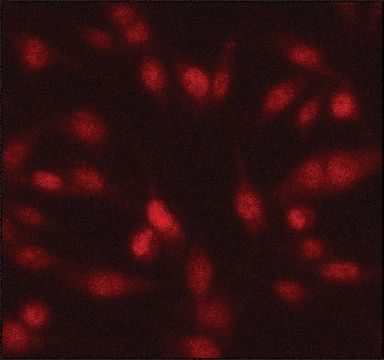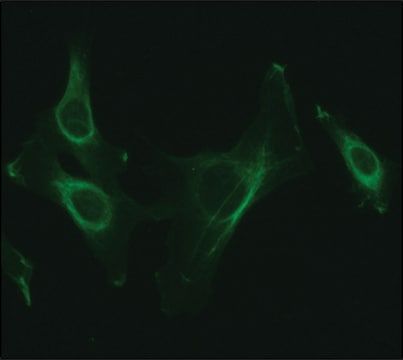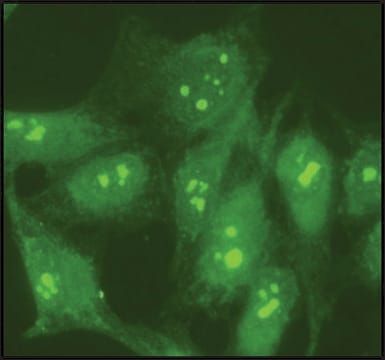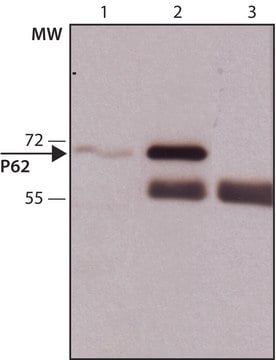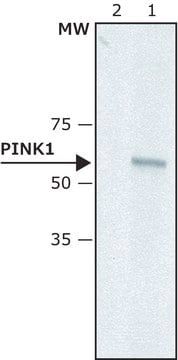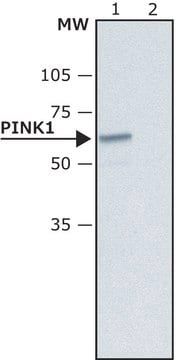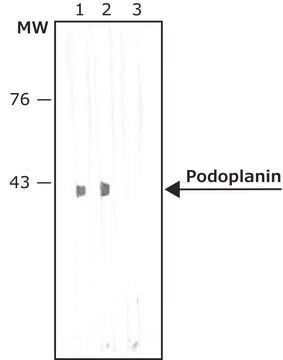P0067
Anti-p62/SQSTM1 antibody produced in rabbit
~1 mg/mL, affinity isolated antibody, buffered aqueous solution
Manufacturer: Sigma Aldrich
Synonym(S): Anti-Sequestosome 1, Anti-Ubiquitin-binding p62
Select a Size
| Pack Size | SKU | Availability | Price |
|---|---|---|---|
| 200 μL | P0067-200-μL | In Stock | ₹ 54,545.40 |
P0067 - 200 μL
In Stock
Quantity
1
Base Price: ₹ 54,545.40
GST (18%): ₹ 9,818.172
Total Price: ₹ 64,363.572
biological source
rabbit
Quality Level
200
conjugate
unconjugated
antibody form
affinity isolated antibody
antibody product type
primary antibodies
clone
polyclonal
form
buffered aqueous solution
mol wt
antigen ~62 kDa
species reactivity
human, rat, mouse
packaging
antibody small pack of 25 μL
Related Products
Description
- General description: p62 or SQSTM1 (sequestosome 1) is a multifunctional, multi-domain adaptor protein which resides at the autophagosome membranes. The human p62 gene is mapped to human chromosome 5. The protein has 440 amino acids. This protein is conserved across metazoans, but not plant and fungi. It is composed of Phox1 and Bem1p (PB1) domain, a zinc finger (ZZ) domain, two nuclear localization signals, a tumor necrosis factor receptor-associated factor 6 (TRAF6) binding domain, a nuclear export signal, an LC3-interacting region (LIR), a Keap1-interacting region (KIR) and a ubiquitin-associated (UBA) domain. It is predominantly present in cytoplasm, but also shows expression in nucleus, autophagosomes and lysosomes.Anti-p62/SQSTM1 is produced in rabbit using as immunogen a synthetic peptide corresponding to amino acids of human p62/SQSTM1 (GeneID: 8878), conjugated to KLH. The corresponding sequence is identical in rat and mouse. The antibody is affinity-purified using the immunizing peptide immobilized on agarose.
- Specificity: Anti-p62/SQSTM1 recognizes human, rat, and mouse p62/SQSTM1. The antibody may be used in various immunochemical techniques including immunoblotting (~ 62 kDa), immunoprecipitation, and indirect immunofluorescence. Detection of the p62/SQSTM1 band by immunoblotting is specifically inhibited by the immunizing peptide.
- Immunogen: Synthetic peptide corresponding to amino acids of human p62/SQSTM1, conjugated to KLH. The corresponding protein sequence is identical in rat and mouse.
- Application: Anti-p62/SQSTM1 antibody produced in rabbit has been used in:western blotting[1]immunoprecipitation in human cell lines Immunohistochemistry prostatectomy specimens
- Biochem/physiol Actions: p62 or SQSTM1 (sequestosome 1) plays a role in the catabolic metabolism of molecules involved in NF-κB (nuclear factor), mTOR (mammalian target of rapamycin), MAPK (mitogen activated protein kinase), and therefore, is involved in cell cycle and apoptosis. It is thought to function as an oncogene, and its accumulation has been associated with poor prognosis. It is accumulated in cell with defective autophagy, and its cytosolic accumulation is linked with poor prognosis in prostate cancer. It is responsible for the activation of mammalian target of rapamycin complex 1 (mTORC1) by functioning as an adaptor for mTORC1 lysosomal membrane. During Dengue virus (DENV) infection, the expression of p62 protein is reduced due to proteasomal degradation, and stable expression of p62 results in decreased DENV replication. p62 is an autophagy marker, and its accumulation is linked with aberration in autophagic degradation or inhibition of autophagy.Mutations in this gene result in sporadic and familial Paget disease of bone. p62 is commonly found in inclusion bodies containing polyubiquitinated protein aggregates, that accumulate in several degenerative diseases. Autophagy is involved in cellular clearance of these protein aggregates. Autophagy plays an essential role in cellular differentiation, cell death, and aging. Defective autophagy may contribute to certain human diseases such as cancer, neurodegenerative diseases, muscular disorders, and pathogen infections.
- Physical form: Solution in 0.01 M phosphate buffered saline, pH 7.4, containing 15 mM sodium azide.
- Storage and Stability: For continuous use, store at 2-8 °C for up to one month. For extended storage, freeze in working aliquots. Repeated freezing and thawing is not recommended. If slight turbidity occurs upon prolonged storage, clarify the solution by centrifugation before use. Working dilution samples should be discarded if not used within 12 hours.
- Other Notes: 2024 CiteAb Award Winner for Supplier Succeeding in Parkinson′s Research
- Disclaimer: Unless otherwise stated in our catalog or other company documentation accompanying the product(s), our products are intended for research use only and are not to be used for any other purpose, which includes but is not limited to, unauthorized commercial uses, in vitro diagnostic uses, ex vivo or in vivo therapeutic uses or any type of consumption or application to humans or animals.
SAFETY INFORMATION
Flash Point(F)
Not applicable
Flash Point(C)
Not applicable
Personal Protective Equipment
dust mask type N95 (US), Eyeshields, Gloves
Compare Similar Items
Show Difference
biological source: rabbit
Quality Level: 200
conjugate: unconjugated
antibody form: affinity isolated antibody
antibody product type: primary antibodies
clone: polyclonal
form: buffered aqueous solution
mol wt: antigen ~62 kDa
species reactivity: human, rat, mouse
packaging: antibody small pack of 25 μL
biological source:
rabbit
Quality Level:
200
conjugate:
unconjugated
antibody form:
affinity isolated antibody
antibody product type:
primary antibodies
clone:
polyclonal
form:
buffered aqueous solution
mol wt:
antigen ~62 kDa
species reactivity:
human, rat, mouse
packaging:
antibody small pack of 25 μL
biological source: rabbit
Quality Level: 200
conjugate: unconjugated
antibody form: affinity isolated antibody
antibody product type: primary antibodies
clone: polyclonal
form: buffered aqueous solution
mol wt: antigen ~60 kDa
species reactivity: mouse (predicted), human, rat (predicted)
packaging: __
biological source:
rabbit
Quality Level:
200
conjugate:
unconjugated
antibody form:
affinity isolated antibody
antibody product type:
primary antibodies
clone:
polyclonal
form:
buffered aqueous solution
mol wt:
antigen ~60 kDa
species reactivity:
mouse (predicted), human, rat (predicted)
packaging:
__
